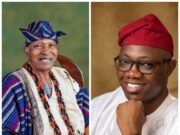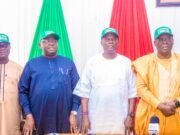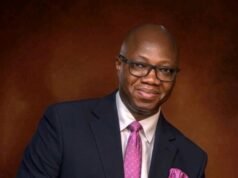Since 1970 when he was installed the 46th Alaafin of Oyo and numero uno Yoruba traditional king at the age of 32, Oba Lamidi Adeyemi has pursued three fundamental goals: widening the space of Yoruba culture and language, pursuit of equity and justice, as well as evangelizing Nigerians who misread current Nigeria’s practice of pseudo-federalism as the original, on the need for the country’s return to true federalism. On these three scores, Oba Adeyemi manifests a stubbornness and activism of no equal. He is ahead of his peers because he is a voracious reader who, even at his well-advanced age, soaks himself in the splendor of knowledge.
For instance, in a recent interview with the Tribune, (November 14, 2020) at a time when filthy lucre is cellotaping the mouths of Nigerian monarchs and elites from apportioning blames on the downward slope of governance and government’s apparent feeble grips on socio-political affairs, Oba Adeyemi chose to speak out.
“These youths are more enlightened now, especially with this new internet technology. They are better exposed. They watch movies; they see how protesters organize themselves and handle security agencies. They know a lot of things. That is why the federal government must handle this matter with care. It is too sensitive. They should not assume intimidation or tough talk would cow these very volatile youths” he exploded on the scalding anger of Nigerian youths recently manifested in the EndSARS protests across the country. You would think Femi Falana was speaking.
Federalism could be said to be Oba Adeyemi’s strongest forte of intervention. In a piece he published in the Nigerian Tribune of August 30, 2016 entitled Imperativeness of Constitutional Federalism as Against Federalism of Might, the highly revered monarch advocated that any meaningful restructuring of Nigeria has to see as its main component the devolution of power from the centre to the states. He cited agriculture which he suggested should be removed from its current concurrent place and left to the states so that they could develop their natural potentials.
“Agriculture should be removed from the concurrent to the residual (list) under any constitutional reforms. For any reform to be made, the First Republic Constitution should be the most credible working paper for guidance. Another aspect that needs a revisit is education. A situation in which education policy is centralized is an antithesis to true federalism. If education was centralized in the First Republic, the Western regional government headed by Chief Obafemi Awolowo would have been hampered from formulating the free education policy at that time. Yet, it was that policy that made the Western region a model for other regions and made Chief Awolowo hero of all times,” he canvassed.
The monarch took his aversion to unitarist federalism to the institution of traditional rulers. Oba Adeyemi is totally averse to the pollution of federalism in the gathering of traditional rulers under the aegis of National Committee of Traditional Rulers. He is even opposed to it now as it is brought back through the back door as an NGO. When it was first launched in 2007 under the presidency of Musa Umaru Yar’Adua, Oba Adeyemi fired a salvo to him at the Presidential Villa dated September 8, 2007.
The monarch, in the correspondence, first sought to intimate Yar’Adua on his qualification for that missive. “As the Alaafin of Oyo and Head of Yoruba nation, prior to the coming of the British colonialist, the Alaafin exercised imperial sovereignty over the whole of Yorubaland,” he said.
The voracious-reader monarch then went into corroborative tissues of history to situate his current unimpeachable position: “Burns, in his History of Nigeria says, ‘While the Alaafin of Oyo was at first in practice and later nominally the suzerain of all the Yoruba chiefs, it is thought that the authority of the Alaafin extended as far as Accra on the West and the banks of the Niger on the East and the fact that King Sango, who was deified after his death and is now the god of thunder and lightning in the Yoruba mythology, is still worshipped throughout Yorubaland, Dahomey and Benin, is a fairly conclusive proof of the extent of the Yoruba kingdom or at least of its influence in early times’,” Kabiyesi told the late president.
Thereafter, the Oba submitted that it was a gross abnormality to have a convocation of “national” traditional rulers because the idea of ‘traditional’ connotes a restricted geographical space and not the unrestricted as in the word “national” connotes. He told Yar’Adua that the only administrator or leader in the history of Nigeria to have ever attempted such nationalization of traditional rulership was Sir Hugh Clifford who, in 1922, appointed six Nigerians into the legislature which included two Emirs – Sultan of Sokoto and another Emir, as well as the Alaafin of Oyo who represented the South, with a civilian each from Lagos, Calabar and the Benin/Warri area.
Alaafin further took Yar’Adua down history lane on how Talbot justified the suzerain of the throne of his forefathers as lengthening even to Dahomey, in today’s Benin Republic. He cited Talbot thus: “In 1772, the Dahomey paid considerable yearly tribute in cowries and merchandise to his formidable neighbor, the king of Oyo… at this period the Yoruba proper under the sovereignty of the Alaafin…” He stated that it was a “battle of facts over fiction” to impose any other traditional ruler on the Alaafin and cited copiously from ancient historical documents to justify his headship of Yoruba kings as well. At the end of Oba Adeyemi’s 14-page letter to the president, Yar’Adua had to stop the idea of a national convocation of kings.
Alaafin had always canvassed that the major role that traditional rulers should play is not to go on a jamboree from one politician to the other, but networking the people in their domain and intimating respective governments on the parlous living state of their people, so that people in government could take action about the situations. He cited how, shortly before the 2006 National Census, he toured over 500 towns and villages in the three local governments under his domain and was able to see how, “in the first millennium, women in many of these villages, with babies tied to their backs, trekked three-four kilometers to fetch water from streams and brooks,” and how “healthcare delivery system in many of the local governments has remained an eyesore.”
In another public presentation to the Senate Committee on the Review of the 1999 Constitution, South West Sub-Committee, on December 15, 2009, Alaafin took the members on a deep tutorial on constitutionalism, federalism and good governance.
In another correspondence he sent to the Vice President of Nigeria, Yemi Osinbajo entitled Restructuring: A national call to duty, he began by telling him that “I will be failing in my duty to the nation and Yorubaland in particular if as the Alaafin of Oyo, I do not lend my voice to this important national subject at this point of our history” because “the Alaafin is historically a major stakeholder in what turned out to be the National Project.” He provided justification for this in how the Alaafin, towards the end of the nineteen century, “invited the British government to intervene in the political intrigues among the various Yoruba communities which escalated to internecine civil wars among the various tribes in Yorubaland.” Indeed, in this correspondence, Alaafin confessed that he was “an unrepentant true federalist,” a choice which he said had made him be at loggerheads with some of his colleague traditional rulers. His submission in the four-page correspondence was that a “state of national unease can only be averted through a revisit of the present lopsided federal structure,” and pleaded that, “because government is a continuum,” it should please revisit the 2014 National Confab to chat a path for tomorrow. What a Nostradamus who saw the EndSARS protest before now!
In 2012, Alaafin wrote an open letter to President Goodluck Jonathan, which was published in some national dailies, challenging his government’s decision to suspend Justice Ayo Salami, then President of the Court of Appeal. After citing constitutional provisions which delineated the boundary of the president’s powers over an Appeal Court judge, the king submitted that, bearing in mind the provisions of Section 238 (4) and (5), the president lacked such powers. The constitution, he said, submitted that a president had no powers in such exercise of suspension of judicial officers but put such on the shoulders of the National Judicial Commission (NJC).
On why he chose to fight for Justice Salami, he wrote: “As a foremost Yoruba monarch and the custodian of traditional rights and obligations of the Yoruba people, I think that charity must necessarily begin at home and that a father should not stand akimbo while his son is being unjustly treated. I have never met Justice Ayo Salami either in his personal or official capacity before but something in me tells me that he is not being fairly treated.” Oba Adeyemi was to meet Justice Salami in flesh and blood as the lingo says, when he and the now retired judge, met at the presentation of awards to the two by the Afe Babalola University in Ado-Ekiti. Salami had prostrated before Alaafin and the foremost monarch had asked him who he was and Salami said and I paraphrase, “you fought my battle without even knowing me…”
Recently, the Alaafin has been extremely bothered about the slide of affairs in Nigeria, especially after the seismic shake of the EndSars protests that shook the country to its foundation. He has been meeting his fellow kings to warn them that sitting unconcerned could be cataclysmic. The 83-year old monarch is ostensibly worried that a major calamity lies ahead unless the troubled spirit of Nigerian youths is appeased with good governance.



































